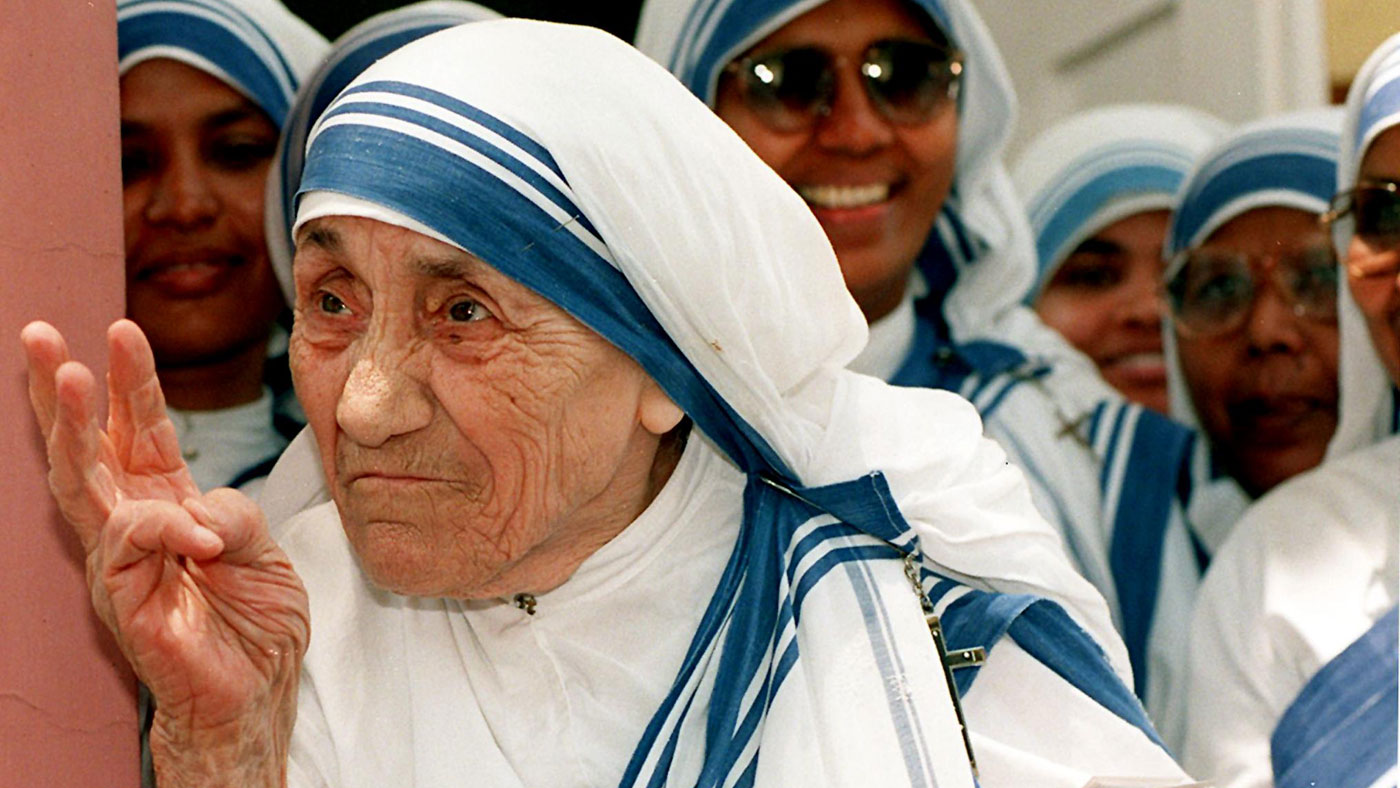Who was Mother Teresa? Saint or sadist
On the anniversary of the Catholic saint’s birth, her legacy is more complex than ever

A free daily email with the biggest news stories of the day – and the best features from TheWeek.com
You are now subscribed
Your newsletter sign-up was successful
Mother Teresa, who was born 118 years ago this week, remains a controversial figure more than 20 years after her death.
Once almost universally revered as a paragon of Christian charity, her legacy is now far less clear-cut.
Who was Mother Teresa?
The Week
Escape your echo chamber. Get the facts behind the news, plus analysis from multiple perspectives.

Sign up for The Week's Free Newsletters
From our morning news briefing to a weekly Good News Newsletter, get the best of The Week delivered directly to your inbox.
From our morning news briefing to a weekly Good News Newsletter, get the best of The Week delivered directly to your inbox.
Born Anjeze Gonxhe Bojaxhiu on 26 August 1910 in what is now Macedonia, Teresa became a nun at the age of 18, having spent much of her childhood convinced she felt a “call” from God to commit herself to a religious life.
In 1950, she travelled to Kolkata (then Calcutta) in India after receiving what she described as the “call within a call”.
There, she set up the Missionaries of Charity order, along with 12 followers, to help the poor and destitute of the city. The order now has hundreds of thousands of employees and volunteers. It runs 758 homes, hospices and shelters in 139 countries around the world.
In 1979, she was awarded the Nobel Peace prize. She died in 1997 and was canonised as a saint 19 years after – a remarkably quick turnaround by Vatican standards.
A free daily email with the biggest news stories of the day – and the best features from TheWeek.com
Why is Mother Teresa so controversial?
In 2016, she was canonised by Pope Francis – but not without fierce controversy. Detractors called her a fraud whose actions exacerbated rather than relieved the suffering of the poor.
Outsiders visiting her Kolkata hospitals reported “grossly inadequate medical care was given to the sick and dying, syringes were reused without sterilisation, pain relief was non-existent or negligible and conditions were unhygienic”, reports The Guardian.
Some critics suggested that Mother Teresa’s hospitals and hospices were not only ineffective at relieving suffering, but deliberately so.
Journalist Christopher Hitchens, who wrote a book criticising the “cult” of Mother Teresa, quoted her as saying: “There is something beautiful in seeing the poor accept their lot, to suffer it like Christ’s Passion. The world gains much from their suffering.”
Her hardline opposition to contraception and abortion have also attracted criticism for further exacerbating the misery of the poor.
Meanwhile, Teresa herself became a global celebrity and spent much of her time travelling around the world in a private plane to meet political leaders.
Hemley Gonzalez, who volunteered for the order ten years after Teresa’s death, wrote that the nun’s head had been turned by “hordes of sycophants”.
Mother Teresa is also accused of misallocating millions of pounds donated by well-wishers around the world, investing money in the Vatican Bank rather than spending it on improving the lives of the poor.
That decision should be viewed in context, says Medium’s Anthony Galli. The elderly nun “wasn’t spending it on a shopping spree” but thought it was better to fund the Church to further its proselytising mission.
Alleviating misery on earth “wasn’t of great importance” within that ideology, he writes. “The goal was to get as many people in the door as possible, i.e. the church door and then heaven’s door.”
-
 Local elections 2026: where are they and who is expected to win?
Local elections 2026: where are they and who is expected to win?The Explainer Labour is braced for heavy losses and U-turn on postponing some council elections hasn’t helped the party’s prospects
-
 6 of the world’s most accessible destinations
6 of the world’s most accessible destinationsThe Week Recommends Experience all of Berlin, Singapore and Sydney
-
 How the FCC’s ‘equal time’ rule works
How the FCC’s ‘equal time’ rule worksIn the Spotlight The law is at the heart of the Colbert-CBS conflict
-
 Epstein files topple law CEO, roil UK government
Epstein files topple law CEO, roil UK governmentSpeed Read Peter Mandelson, Britain’s former ambassador to the US, is caught up in the scandal
-
 Iran and US prepare to meet after skirmishes
Iran and US prepare to meet after skirmishesSpeed Read The incident comes amid heightened tensions in the Middle East
-
 Israel retrieves final hostage’s body from Gaza
Israel retrieves final hostage’s body from GazaSpeed Read The 24-year-old police officer was killed during the initial Hamas attack
-
 China’s Xi targets top general in growing purge
China’s Xi targets top general in growing purgeSpeed Read Zhang Youxia is being investigated over ‘grave violations’ of the law
-
 Panama and Canada are negotiating over a crucial copper mine
Panama and Canada are negotiating over a crucial copper mineIn the Spotlight Panama is set to make a final decision on the mine this summer
-
 Why Greenland’s natural resources are nearly impossible to mine
Why Greenland’s natural resources are nearly impossible to mineThe Explainer The country’s natural landscape makes the task extremely difficult
-
 Iran cuts internet as protests escalate
Iran cuts internet as protests escalateSpeed Reada Government buildings across the country have been set on fire
-
 US nabs ‘shadow’ tanker claimed by Russia
US nabs ‘shadow’ tanker claimed by RussiaSpeed Read The ship was one of two vessels seized by the US military